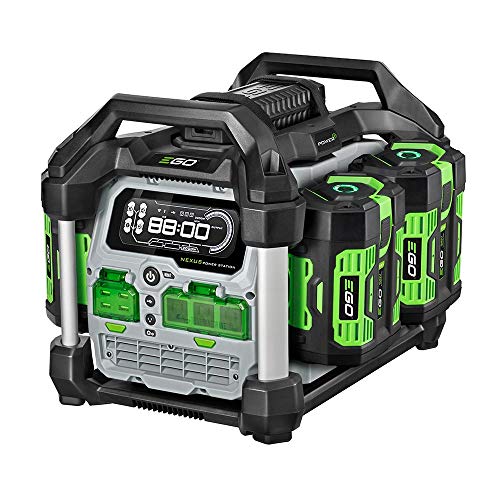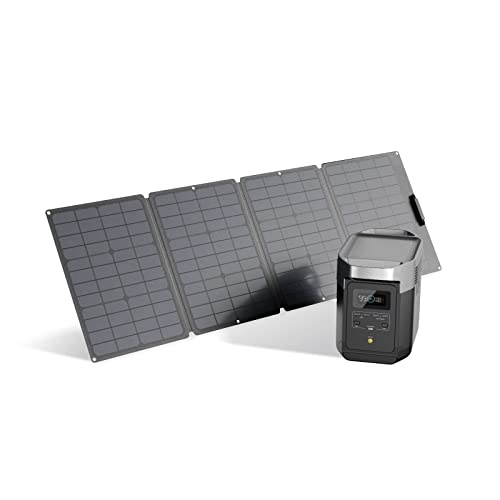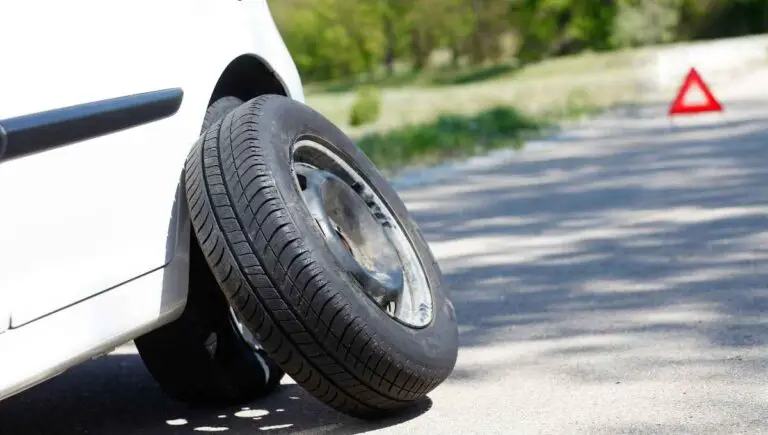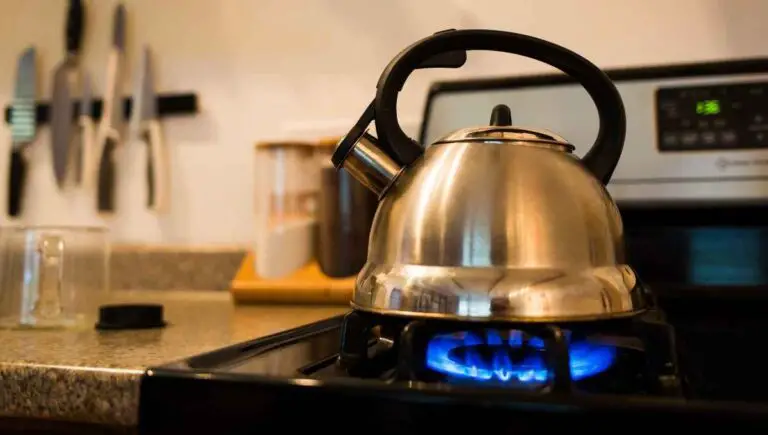Can You Use a Generator in an Apartment? (We Cover It All)

Apartment living is great – until your power goes out. With working from home, online school and deadlines looming, the power definitely needs to stay on. Can you use a generator in an apartment though?
You can use a generator inside an apartment as long as it’s battery-powered and NOT gas-powered. Gas-powered generators should only be used outside in open spaces. There are many safe-to-use battery-powered generators available for apartment living that will work to keep things running.
In this blog post, we will let you know exactly why you shouldn’t use a gas generator and how you can shop wisely for a battery-powered one. Let’s get into it!
This post contains affiliate links from Amazon and other stores. This means Yard Blogger may earn a commission if you make a purchase using any of our links. Please refer to our full affiliate disclosure policy for full details.
Here’s a Quick Pro Tip!
Thankfully, battery-powered generators are perfect for indoor use. So, before you get stuck with the lights out again, make sure you have a backup energy source on hand.
Here are some of our favorites from Amazon:
1. EcoFlow Delta Pro – An excellent eco-friendly option
2. Bluetti Power Station – A powerful generator even capable of powering a fridge
3. Jackery Power Station – The perfect generator for charging only smaller electronics like laptops and phones
What to Do When the Power Goes Out in Your Apartment
If you live in an area that frequently gets hit by hurricanes and tornados, you can be very accustomed to dealing with power outages.
But, these natural disasters are becoming more frequent these days, causing you to lose power for sometimes weeks. In this case, you may need to consider buying a portable generator.
Let’s discuss if this is a good idea for you.
Should I Buy a Generator if I Live In an Apartment?
If you are considering buying a generator for your apartment, you should look into battery-operated generators instead of gas-powered ones. Gas-powered generators come with some risks for apartment dwellers.
If you run a gas-powered generator in your apartment, you are increasing your risk of getting poisoned by carbon monoxide.
Anything that runs on gas will release carbon monoxide and if that is being released into a small, compact space, there is a higher chance of it affecting you.
Additionally, gas-powered generators tend to make a lot of noise. Since the power has gone off, your apartment building will be extra quiet so your neighbors will definitely be able to hear it.
Although they should be understanding of the situation, your neighbors will already be irritated that the power is off so their patience may be lower than usual.
You might also enjoy our post on What to Do if Your Neighbor Keeps Complaining About Noise
What Kind of Generator Can I Use in an Apartment?
You can use either a gas generator or a battery generator in your apartment. However, the battery-powered generator is generally the better option since it is quieter and safer.
Although gas generators have a lower ticket price, they are slowly becoming a thing of the past, especially if you live in an apartment.
Not only is the gas generator noisy, but it can also be extremely dangerous to your health since it produces carbon monoxide.
When you combine carbon monoxide and a small space, your chances of getting carbon monoxide poisoning are much higher.
Additionally, you are more likely to have to ask your landlord or management company for permission to use the generator because of the health and safety risks.
They likely won’t even let you use it on your balcony since the fumes can reach your neighbor’s apartment through vents.
What Generators Can Be Used Indoors?
The best generator to use indoors is a battery-powered generator, also known as a portable battery power station. These generators are quieter and safer compared to gas generators.
The fume and smoke-free aspect of battery-powered generators make them ideal for indoor use in an apartment.
When buying an indoor generator, you want to consider features including:
- Battery capacity
- Output potential
- Charging capabilities
Is It Safe to Use a Generator Indoors?
It is safe to use a generator indoors as long as you are not using a gas-powered generator, specifically if you live in an apartment. Gas-powered generators emit carbon monoxide which can lead to poisoning if inhaled.
On the other hand, battery-powered generators are extremely safe to use indoors as they are essentially designed for that. They do not release any fumes, smoke, or fuel making them ideal for apartments.
How Long Will a Generator Battery Last?
The amount of time a generator battery will last strictly depends on what you are charging. For example, a fridge is going to use more power than an iPhone, therefore, causing the battery to run out faster.
But, in general, if you buy a quality generator, you will be able to charge appliances for at least eight hours and keep your phone charged for weeks!
For example, the Jackery Solar Generator Explorer 1000 will charge your phone 100 times, keep your TV powered for 17 hours, and your coffee maker for 50 minutes!
Sounds like a good night during a storm.
Considering a Generator for Apartment Use
Now that we have your wheels spinning, let’s discuss the best generators you can use in your apartment. Hint: it’s not a gas generator.
What Generator Should You Use in Your Apartment?
A battery-powered generator, also known as a portable power system, is the best type of generator to use in an apartment. This is thanks to its compact size, quiet nature, and excellent energy capacity.
One of the highest-rated portable power stations is the Goal Zero Yeti Lithium 3000X– with a superhero name like that, it better be.
This portable power station is specifically designed for emergencies, so you don’t have to panic when the power goes out… again!
Just make sure it’s charged up and ready to go, of course- and that only takes 14 hours from a wall outlet.
Can Portable Generators Be Used Indoors?
Portable generators can definitely be used indoors- as long as it’s a battery-powered generator, also known as a portable power system. Gas generators are too dangerous to be used in small indoor places as the risk for carbon monoxide poisoning is high.
Therefore, you should avoid using gas generators as much as possible, especially if you live in an apartment.
Apart from the possible poisoning, they are also extremely loud and use up a lot of gas which is not great to have lingering around your apartment.
You might also enjoy our post on What to Do if Your Neighbor Has Bed Bugs
Can a Generator Run Indoors?
A generator can definitely run indoors as long as it is charged. Battery-powered generators are specifically designed to be used indoors for when the power goes out during storms.
But, if you are thinking of running a gas generator indoors, you should tread carefully, especially if you live in an apartment.
A gas generator produces carbon monoxide and if you live in a small space, you are more at risk of being a victim of carbon monoxide poisoning.
Are There Gas Generators for Apartments?
Gas generators do exist for apartments but they are dangerous and should be avoided. Anything that uses gas will produce small amounts of carbon monoxide.
In most cases, the amount of carbon monoxide released is not enough to cause any harm unless you live in a small space. This gives the carbon monoxide a smaller area to gather and become dangerous.
Can a Natural Gas Generator Be Installed Indoors?
It is never a good idea to have a natural gas generator be installed indoors. If you want to use a gas generator, you should keep it outside away from any windows, doors, vents, or crawl spaces.
A gas generator emits carbon monoxide, which can kill you in minutes if you inhale it. Carbon monoxide is colorless and odorless so it is impossible to know when you are inhaling it, which makes it so dangerous.
Should I Buy a Gas or Battery-Powered Generator in My Apartment?
A battery-powered generator is always the best option to use indoors, especially in an apartment. A gas generator emits carbon monoxide which can kill you in minutes if the generator is in your apartment.
Therefore, you should definitely consider a battery-powered generator over a gas-powered generator.
Battery-powered generators are designed to be used indoors and are therefore quiet and safe. You should choose a generator based on how long your power typically goes off and what you plan to power with the generator.
For example, if your power typically does not go off for long, you can choose a generator that is meant for charging smaller electronics such as phones and laptops.
But, if you live in an area that frequently experiences hurricanes, you may want to consider a generator that is able to power larger appliances like fridges.
Can You Use a Gas-Operated Generator in an Apartment?
It is not a wise idea to use a gas-operated generator in your apartment due to the fact that gas generators emit carbon monoxide. Carbon monoxide can kill you in minutes.
Gas generators should only be used in outdoor, open spaces away from any windows, doors, vents, or crawl spaces.
The carbon monoxide that emits from a gas generator can kill you if it is released into a small, confined space, including an apartment. Even if you like in a penthouse, it is still a bad idea.
Can You Use a Solar Generator Indoors?
You can definitely use a solar generator indoors. They are quiet, safe, and compact, making them perfect for indoor use.
However, you can’t use the solar panels indoors to charge it- but we’re sure you knew that!
Solar generators are mainly designed for camping trips when you don’t have any electricity to recharge the battery. Yet, they are still very practical to use indoors thanks to their quiet nature and safe features.
You might also enjoy our post on How to Manually Open Garage Doors Without Power
Can You Run an Inverter Generator Indoors?
Although inverter generators emit less carbon monoxide than gas generators, they still emit enough carbon monoxide to build up to unsafe levels in an indoor space, especially in apartments.
Therefore, it is not wise to use an inverter generator in an apartment. You are putting your health at risk as well as your neighbors since carbon monoxide is able to travel under doors and through wall vents.
Where Should I Keep My Generator?
You should keep your generator in a dry place with the cords properly secured so no one can trip over them. When your generator is not in use, store it in a dry and dark place away from any direct sunlight.
When the power is out, sometimes you can’t always control where your generator goes since you need to keep it close to the electronics you need to charge.
But, if you have an option, try to keep it in a cool, dry place. Keep all cords away from any foot traffic areas so no one will trip over the cords.
Additionally, do not keep the generator in the middle of a foot traffic area. Since the power is out, it will be more difficult to see objects, especially when the sun goes down.
Can You Run a Generator on an Apartment Balcony?
It is not likely that you will be allowed to run a gas generator on an apartment balcony since the carbon monoxide fumes can still travel throughout the apartment. For a battery generator, you can leave it on a balcony if the weather is not extreme.
Most apartment management companies or landlords will not allow you to run a gas generator on your balcony.
The carbon monoxide fumes can travel through windows and vents potentially causing carbon monoxide poisoning.
On the other hand, you can leave your battery generator on your balcony as long as the weather is not extreme, including high winds, lightning, snow, extreme heat, or extreme cold.
Size Matters
If you are planning to power large appliances with your generator, you need to consider the strength of your generator so you don’t end up with rotten milk. Let’s discuss.
What Size Generator Do I Need for My Apartment?
To decide which size generator you need for your apartment, you need to determine what you are planning to power. Unfortunately, you can’t power everything unless you buy at least five separate generators.
If you plan on keeping larger appliances powered, such as fridges, you will need a generator with at least 2000 watts. Anything with fewer watts is enough to power smaller appliances such as microwaves and toasters.
Is There an Indoor Generator for a Fridge?
Powerful battery-powered generators are strong enough to power a fridge for at least eight hours. If you have a mini-fridge, they can last for even longer, up to 14 hours.
Specifically, the EcoFlow Delta Solar Generator is known to power a regular-sized refrigerator thanks to its 3300 watts of output wattage.
Can a Portable Generator Run a Refrigerator?
High-powered generators are strong enough to run a refrigerator if your power goes out. However, generally, the generator will only last for up to eight hours if it has to power such a high-energy appliance.
Yet, it is possible! If you live in an area that experiences a lot of hurricanes that cause your power to go out for at least a week, a generator that is able to power your fridge is much needed.
Thankfully, there are a few options that are able to power fridges:
How Do You Power a Fridge With a Generator?
Powering a fridge with a generator is possible if you have a strong enough generator. Generators with at least 3000 watts of output wattage are enough to power a standard-sized refrigerator.
One of the best battery-powered generators to power a fridge is the Generark Solar Generator thanks to its powerful output.
With this generator, you don’t have to worry about putting sour milk in your coffee the morning after a long night without power.
Related Questions
How Should I Dispose of My Generator Battery?
Generator batteries are considered hazardous waste and should be disposed of properly. You can either recycle the battery or drop it off at a home hardware store that typically has a special recycling program for them.
Your city will have proper instructions regarding what to do with your battery as each city has different recycling programs.
Just ensure you do not throw away your battery for regular garbage collection since batteries contain lithium which can be very harmful to the environment and to humans.
Final Thoughts
Thanks to the advancement of technology, we no longer have to light the candles and eat sandwiches every time the power goes off. Although, that is fun!
Battery-powered generators provide us with safe and reliable energy that can help us weather any kind of storm.
Just please, no gas generators inside.














